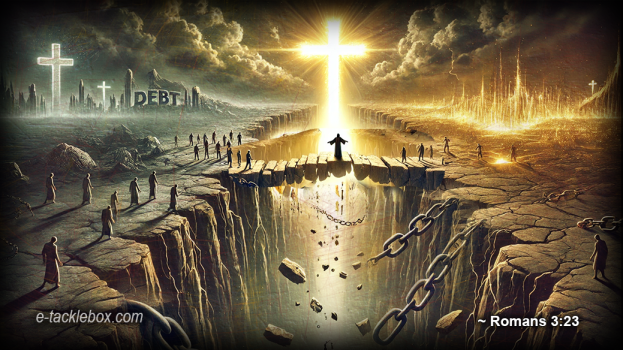
“For all have sinned and fall short of the glory of God.” ~ Romans 3:23
– This verse affirms the universal nature of sin—everyone is guilty before God.
People go to great lengths to deny, distort, or soften the most hated and uncomfortable truth revealed in Scripture: that every human being is a sinner. In our natural state, we resist this message, preferring to think of ourselves as mostly good, misunderstood, or just flawed in minor ways. But the Word of God speaks clearly and forcefully against that delusion. Sooner or later, no matter how persistently someone denies it, the truth will stand—because every soul will one day stand before God, and there will be no excuses, no defense, no escape.
Scripture does not present sin as a minor mistake or a collection of poor choices—it reveals it as a deep corruption of the human heart. Romans 3:10–12 states, “As it is written: ‘None is righteous, no, not one; no one understands; no one seeks for God. All have turned aside; together they have become worthless; no one does good, not even one.’” This is not just a bleak description—it is a divine indictment. Sin is not merely something we do; it is who we are by nature. As a result, we are spiritually dead and blind to the truth. The gospel, though it is the power of God for salvation, is foolishness to those who are perishing, as 1 Corinthians 1:18 says: “For the word of the cross is folly to those who are perishing, but to us who are being saved it is the power of God.”
This condition brings not only corruption—it brings divine judgment. According to Romans 6:23, “For the wages of sin is death, but the free gift of God is eternal life in Christ Jesus our Lord.” The death here is not limited to physical death; it includes eternal separation from God under His wrath. Hebrews 9:27 warns, “And just as it is appointed for man to die once, and after that comes judgment.” Sin brings consequences—eternal ones. And John 3:36 makes the choice starkly clear: “Whoever believes in the Son has eternal life; whoever does not obey the Son shall not see life, but the wrath of God remains on him.”
Why is this message so offensive? Because it confronts human pride. It declares that we are not good, not in control, not capable of saving ourselves. It tears down every illusion of self-righteousness and confronts us with the reality that we stand condemned apart from divine mercy. But denying the truth doesn't change it—it only hardens the heart and seals the judgment that is to come.
Sin is more than a moral flaw—it is a debt owed to a holy and righteous God. Romans 3:23 tells us, “For all have sinned and fall short of the glory of God.” Every sin—whether in thought, word, or deed—is a direct offense against God’s perfect standard. And because He is just, He cannot simply overlook or ignore sin. Forgiveness is not a matter of God sweeping sin under the rug. Justice must be satisfied.
That is where the mercy of God shines. Though we could never repay the debt of our sin, God made a way. Jesus Christ, the spotless, sinless Son of God, willingly came to bear the punishment we deserved. As Isaiah 53:5 declares, “But he was pierced for our transgressions; he was crushed for our iniquities; upon him was the chastisement that brought us peace, and with his wounds we are healed.” On the cross, Christ bore the full weight of God’s wrath against sin. His death was not a tragedy—it was a triumph. When He cried out, “It is finished” (John 19:30), the price was paid in full.
Through His resurrection, God confirmed that Christ’s sacrifice was accepted, and now forgiveness is freely offered to all who will repent and believe. As Colossians 2:13–14 says, “God made you alive with Christ. He forgave us all our sins, having canceled the charge of our legal indebtedness… he has taken it away, nailing it to the cross.”
This is the only hope for sinners: not denial, not self-improvement, but full surrender to the Savior. The truth is hard—but it is also glorious. For those who believe, the burden of sin is lifted, the debt is canceled, and eternal life is the gift of grace. The most hated doctrine becomes the doorway to the most precious reality—reconciliation with God through Jesus Christ.
Last edited:


